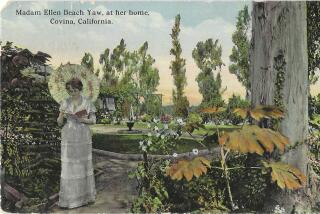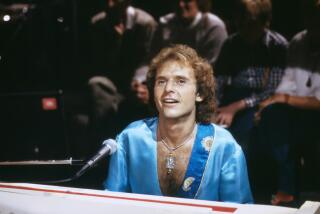True Grit
- Share via
When Link Wray says he comes to gigs ready to rumble, it’s no idle boast.
Wray was one of the first rock ‘n’ rollers to wield an electric guitar the way cavemen wielded clubs--for no other purpose than to deliver a crude, brutal body blow. The North Carolina native made his first, and most enduring, mark in 1958 with “Rumble,” an instrumental built around a primitively stroked, three-chord riff of ringing doom. It was a seminal moment in the development of garage rock, a form that owes its juiciness to a raw, nasty, enthusiastic simplicity of concept and execution.
But when Wray began his current tour in Houston three weeks ago, his resolve to rumble was mixed with an uncharacteristic queasiness about what awaited him. Europe had become his main rumbling ground since 1980, when he married a Danish woman and moved to a rural island off the Danish coast. At 68, Wray felt jittery about playing in the United States for the first time since 1985.
“I was scared; I’ll tell you the truth,” Wray said by phone last week from a hotel in Portland, Ore., a stop on the tour that brings him to the Foothill in Signal Hill tonight.
“I jumped off the plane in Houston [and thought], ‘Maybe the American kids won’t be the same toward me as the European kids.’ ”
Wray said he has benefited from the European fascination with American originals and that being part Shawnee Indian hasn’t hurt his credibility. But would any of that matter back in the United States?
As it turned out, Wray said, when he arrived on stage in Houston, the fans were raring to rumble with him.
“They were banging on the stage, [chanting] ‘We love Link Wray, we love Link Wray,’ and [the tour] has been fantastic ever since.”
Wray has a lot in common with Dick Dale, the surf-guitar originator from Orange County. Both were pioneers in playing simple instrumental rock with searing effect. Wray’s ‘50s and ‘60s recordings (available on a strong “Best of” compilation from Rhino) form an East Coast bookend to Dale’s ‘60s surf-guitar runs in establishing a framework for rock played loud and raw.
Now Wray is following Dale on the ‘90s comeback trail, seeking an audience of young fans who like their music aggressive and are delighted to see a sexagenarian originator who can still roar.
When Dale rekindled his career in 1993 with the dynamic album “Tribal Thunder,” he included a ferocious version of “Rumble.” Director Quentin Tarantino used music from both Dale and Wray in the 1994 movie “Pulp Fiction” (although only Dale’s “Miserlou” made it onto the hit soundtrack album), and Wray’s original “Rumble” turned up last summer in the movie “Independence Day.”
“I’ve never met Dick Dale, but he plays a fantastic guitar,” Wray said. “That guy’s fast. I heard from Europe he put my song on his record. That’s fantastic.”
Wray says he hasn’t heard Dale’s version of “Rumble,” nor has he seen “Pulp Fiction” or “Independence Day.” He says he relies on his wife, Olive, and their 14-year-old son, Oliver, to keep him posted on such developments.
Wray’s new album, “Shadowman” goes for unadorned, garagey essences. Playing with two young Danes who look like refugees from the Ramones, Wray makes a lot of noise, except when pausing to sing a sincere but labored cover of a Hank Williams ballad, “I Can’t Help It (If I’m Still in Love With You).”
*
On this tour Wray is being backed by two members of the San Francisco roots-rock band Dieselhed, which is opening the shows.
The grungy style of “Shadowman”--so far available only on import--is what comes naturally, Wray said.
“I’ve always played raw music, except when I was on big labels. They get a producer and want to clean you up and do it the way they want to. I just went back to playing [bad] Link Wray music. That’s all it is--just noise.”
Wray illustrated the point with a preview of a few moments from his show. He sounded like an agitated turkey facing the ax as he vocalized some choice guitar effects.
“I like to walk to the edge of the stage so the kids can hit my guitar and the wiggle stick and go wah-wah-wah, while I’m screaming notes, whee-whee-whee,” he said. “They love it.”
To hear Wray tell it now, it all began with a scene reminiscent of the opening sequence of “The Buddy Holly Story,” where Holly gets tired of twanging politely and starts to rock, setting off mayhem in a Texas roller rink.
*
For Wray, it was a hot-rod show in Fredericksburg, Va. He and his brothers, singer Vernon (who went by the stage name Ray Vernon) and drummer Doug, were the house band for the event. Somebody asked for a stroll rhythm. Wray’s account of the following musical discovery and crowd uproar came with more sound effects, spelling out the beat and--dum-dum-duuum--the guitar riff of “Rumble.”
“God zapped ‘Rumble’ in my head, and I’ve been rumbling ever since,” he said. “Rumble,” which he says he made up on the spot on the car-show bandstand, had no title until the teenage daughter of the head of Cadence Records heard a demo recording and told her theretofore unimpressed dad that it reminded her of the gang-fight scenes in “West Side Story.” The song soon became a hit, except on a few stations that banned it for fear it would foster juvenile delinquency--quite an accomplishment for an instrumental.
The success of “Rumble” in 1958 led to a major deal with Epic Records for Wray and his brothers, and they followed it in ’59 with another hit, “Raw-Hide.”
It was the heyday of instrumental rock, and Wray got to play the wild man’s role. “If Duane Eddy twanged away for white, teen-aged America, Link Wray played for juvenile delinquent hoods,” wrote Cub Koda, annotator of the Rhino “Best of” CD.
Wray’s run-ins with producers who wanted to tame his sound led him and his brothers to become their own cottage industry during the ‘60s and early ‘70s, making records in a converted shack on the Maryland farm where they lived. Ray and Doug died in 1979 and 1984.
*
In the late ‘70s, Wray was part of the dawn of the rockabilly revival, teaming with singer Robert Gordon on two influential albums. Then came love, marriage and expatriation to Denmark.
“I missed the United States, but I didn’t have no bookers ‘cause I wasn’t on a big label, so none of ‘em called me up,” said Wray, who last toured here in 1983 and 1984, returning for a single “Guitar Greats” program in 1985.
He says his recent film soundtrack credits and an ambitious new manager have made his return possible. Wray hopes a U.S. label will pick up “Shadowman” by the time he returns later this summer to tour the East Coast.
“I’ve still got black hair; I’m still skinny and playing rock ‘n’ roll,” said the old guitar hero, who doesn’t sound as if he has lost any of his enthusiasm either. “I’m 68 years old, but my music is 20 years old. I’m just playing rock ‘n’ roll the rest of my life.”
* Link Wray and Dieselhed play tonight at the Foothill, 1922 Cherry Ave., Signal Hill. 9:30 p.m. $20. (562) 494-5196 (club); (562) 984-8349 (taped information).
More to Read
The biggest entertainment stories
Get our big stories about Hollywood, film, television, music, arts, culture and more right in your inbox as soon as they publish.
You may occasionally receive promotional content from the Los Angeles Times.











